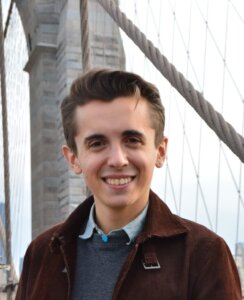Leah Forster’s new off-Broadway show is anything but Orthodox
The ex-Haredi TikTok comedian on coming out and into her own in ‘That’s Yentatainment’
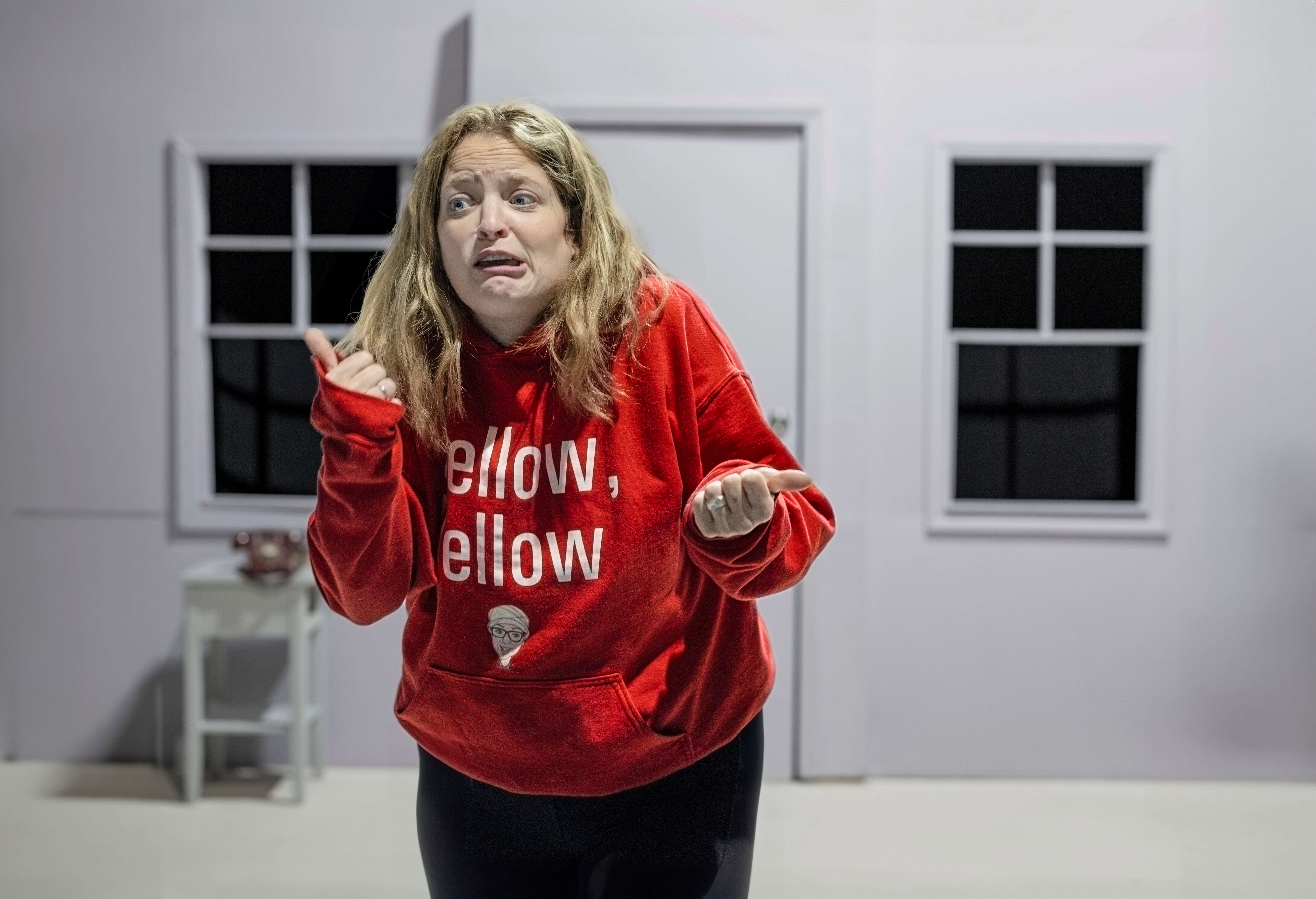
Comedian Leah Forster stars in That’s Yentatainment, a one-woman-show currently playing at the Theater For The New City in the East Village Photo by Yana Lande, courtesy of the New Yiddish Rep
As a child, Leah Forster’s mother told her she should be on Broadway. Unfortunately, Forster understood that path wasn’t possible; that’s because Forster grew up in a Haredi family in Borough Park, where Broadway was “goyish.”
“Which, to my mother, anyone who wasn’t like us was goyish,” Forster told me over lunch. “Haimish people don’t go to the theater,” she said in a thick Yiddish accent. (Haimish is Yiddish for old-school, or unpretentious.)
Now, as a 43-year-old artist living in the secular world, Forster is on track to realize her childhood dreams with her first off-Broadway play. Her new one-woman-show, That’s Yentatainment, recounts her insular, Haredi upbringing, as well as the painful incident that led to her being forcibly outed as a lesbian and shunned from her community. The play grapples with loneliness, social media fame and the complex process of finding one’s voice.
If that sounds like prime material for 70 minutes of musical comedy — replete with vaudeville-inspired dance numbers, charming character work and moving monologues — then maybe you get Forster’s schtick. That’s Yentatainment, produced by the New Yiddish Rep and now playing at the Theater For The New City, tells Forster’s journey from being a closeted Haredi teacher to a viral sensation, and now to being a writer-performer charting her own path.
Forster’s show incorporates many of the characters that helped her find fame on Instagram and TikTok, platforms where she now holds over 100,000 followers. There’s Tichel Tuesday, in which Forster dons an Orthodox Jewish head-covering and transforms into a chatty Haredi mom. Or Bila, a character who Forster says“just marinates in chutzpah” and delivers sassy clapbacks.
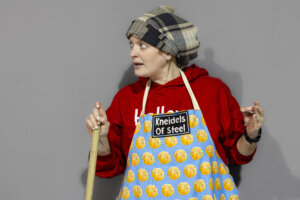
I caught up with the real Forster — though she contains bits of each of her characters — the day after the opening weekend of her show. Over plates of shakshuka at a kosher restaurant in the West Village — “it’s kosher, but depends who you ask,” she quipped — Forster told me about how being a Haredi sensation and later a social media star prepped her for her first foray onto the secular stage.
This interview has been lightly edited for length and clarity.
SAMUEL ELI SHEPHERD: Before you were in the secular world, you were a comic and a teacher in the Haredi community for many years. At what point did you realize that you’re not just funny among your friends, but that you could also pursue comedy as a career?
LEAH FORSTER: Laughter. It is so easy for me to elicit laughter. From a very young age. Even when I was in the ninth grade, I got called into the principal’s office asking me to be part of a 12th grade production, because they needed a funny part.
I was raised in an all-girls school. Very haimish. Very religious. Every morning we prayed for the first hour. I was chosen to be the female cantor, and that was the only time I liked praying: when I got to sing in front of everyone. I always thought I would do better in front of an audience than part of an audience. I’m a leader!
And then you started performing standup and plays within the Haredi world, while also working as a high school teacher at a religious school. Were you a big deal in the world of Haredi entertainment?
When I was outed, my community mourned for me. It was such a death to them because I was so big. I was a prestigious high school teacher from a prestigious haimish family heading productions.
The hardest part for me about coming out and being outed and living authentically is that I feel like I’m forever playing parts. It’s always a costume of some sort. Where I am now, at 43, is I’m exhausted. I’m tired of wearing costumes. Now I’m just me. There’s a bunch of costumes out there, but I’m not playing any more parts.
Since leaving the Haredi world, so much of what has helped you find fame in the past few years has come from playing these different characters online: Tichel Tuesday, Bailey, etc. Are these all based on real people you knew growing up?
Humor is hard! The characters came from actual things. In our community, there are sub-sects that never see each other in the Jewish culture. I had never met a Reform Jew, I never met a Modern Orthodox Jew. So, when I discovered there were other Jews, I was like, “What? Mind blown!”
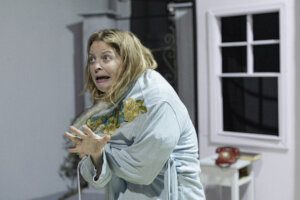
One time I went on the train when I was like 15, I went to Brighton Beach in Brooklyn. There was this girl next to me who was like, “Did you see Nathan? He was flirting with me.” She goes to Kingsborough College and wants to be a dental hygienist. And that’s how “Natasha” came to be.
Or “Bailey” was the business in the basement. Because the first time I went for a bra my mother schlepped me into this store in a business in the basement, a lingerie store, and four old ladies were surrounding me with measuring tapes, yelling across the room, “The right is bigger than the left!” Mortifying! And then I created a character who has businesses in the basement.
Do you feel this version of yourself you are presenting in the show is another character, or is it the real Leah?
It’s definitely a version of me. When I was closeted, that’s how I lived. When I was a teacher, that’s how I lived. When I became a mom, that’s how I lived. There were always pieces of me that I had to compartmentalize. So yeah, essentially when I get out there on stage, I’m still performing, whether I feel like it or not.
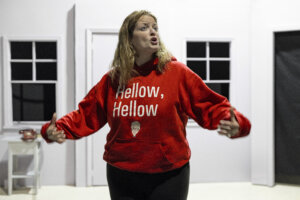
I hope people understand that I’m still figuring it out. Unfortunately, that is the result of wearing so many costumes. You put on a sheitel for 12 years. You put on a long skirt your whole life. You put a smile on your face when you’re struggling inside. That becomes your life. It’s very hard to peel away the layers.
This play is about me sharing the difficult layers, but also my favorite pieces. My favorite pieces of Yiddishkeit are the pieces I want to hold on to. And that’s the part I’m sharing with the public. Like the pieces I own or love. The food, the music, the costumes, the people, the characters. I even want to talk about it now. That’s what feels at home to me.
Funny you say that. In the past eight years or so, there’s been an explosion of media about people leaving the Haredi world. I’m thinking Netflix’s adaptation of Unorthodox, My Unorthodox Life, the documentary One of Us, or Abby Stein’s memoir Becoming Eve, which is now also being made into a play.
Something these stories often do is depict the Haredi world as this story of binary: You’re either “all-in” and completely invested in the community or “all-out,” and want nothing to do with anything remotely Haredi. Do you think your play challenges that binary?
When you’re lost and broken, you will hold on to anything, whether it’s good or not so good. The first organization that I was very involved with was Footsteps, because they were the only people that I knew that were dealing with other people like me.
I loved the concept, but where I got stuck was in the philosophies. There is an undertone of bitterness and anger that never felt right with me. But when you separate from a community that goes through trauma, you hang on to other people that have shared trauma and therefore you trauma-bond.
We would sit around and share the same misery, the background it came from. But the truth is, I didn’t want to spend the rest of my life being miserable. I wanted to be happy. And so I needed to learn that I can let go of the misery and I can still hold on to the beautiful parts.
I’m religious. I’m Shomrei Shabbos. I keep kosher. Like I want that for myself. I want that life because it’s my choice. I’m okay with choice.
In 2024, when it comes to religion, when it comes to politics, people struggle with accepting who you are. I don’t want to be tolerated. I’m not lactose. I want to be loved and celebrated.
Two communities you’re a part of — the Jewish world, and the LGBTQ+ community — have a lot of labels attached to them, e.g. Reform, Conservative, Orthodox or lesbian, bisexual, queer. What labels do you identify with, if any?
I’m very grateful to my child for teaching me about what it means to be nonbinary. Because once I understood that it means all of the above and none of the above at the same time, I was like, oh, that’s me. I’m just a person. I’m a human. As my child calls it, “We have a meat suit, so I’m here.” But I subscribe to nothing and everything at the same time.
What other projects are you working on?
My new book, CLUB M.I.L.F.F, is the book that nobody expected me to write. The story is Leah Hart, who is an ex-ultra Orthodox Hasidic woman who escaped an arranged marriage, has a 20-year-old in college, and is rediscovering her life in Brooklyn. She goes to a “poga class,” which is a pole and yoga class. She meets two amazing friends, Mel and Natash.
And Natash says, “You should join Club M.I.L.F.F: Mothers Interested in Launching Financial Freedom. What they do is they take these crazy business ideas these women have and they fund them, and they make them millionaires. And then the M.I.L.F.F.s start disappearing one by one.
It’s fiction. I don’t want to just tell my story. I want it to be fabulous and wild.
Your future projects are fictional, even if based on some elements of your real life, whereas this play is autobiographical. Do you think performing That’s Yentatainment has given you closure on your past, so you can explore more forward-looking endeavours?
I had my closure! In fact, it’s the opposite. Like Leah, why are you still talking about this?
But there’s art in my life. There’s art. And who else better to tell the story than the master storyteller? Me. I’m still alive. I’m still young enough to sing the songs. Why do I have to be dead? Why do I have to be like Emily Dickinson? Let me have the moment.
